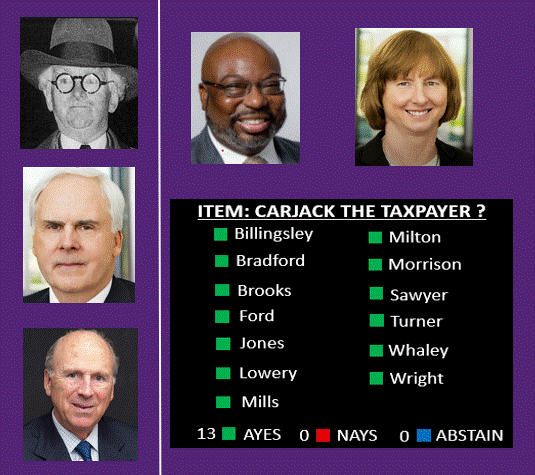With structural budget problems, local social justice and fiscal conservative government efficiency efforts are a pack of lies in the face of runaway elitism. On balance, such efforts in Memphis are merely symbolic while serving as camouflage for runaway elitism. There is no social justice or fiscal conservatism in the face of runaway elitism.
The creation of the fiscally liberal Economic Development Growth Engine (EDGE) was sold on the basis of government efficiency and fiscal conservatism. And Black History Month was capped off last week with the unanimous reappointment of Al Bright as EDGE Board Chair.
EDGE was born out of the FedEx/Memphis Tomorrow complex that is down in all categories over 20 years while their initiatives use taxpayer money. And as EDGE Chair, Bright has marshalled 8 years of runaway elitism on the back of a majority black community in need. During the last 8 years, excessive corporate/real estate incentives have roared for the benefit of the small few, while small business has struggled and the workforce development system has been systematically botched using taxpayer funds.
Getting the tax rate right will help but it won’t make up $85M. The data suggests, the chief challenge is confronting a rigged elitist system where there is no legislative division. Productive division, rhetoric and political blame is needed in the system to check runaway elitism. In legislatures outside of Memphis, one will hear productive rhetoric within debate such as “corporate welfare”, “elitist giveaway” and “elitism”. But not in Memphis.
Local legislators will not even consider the data, discuss the existence of excessive tax incentives or the perils of an unchecked FedEx/Memphis Tomorrow public-private complex that has resulted in competitive ecosystem decline over the last 20 years. Fred Smith and Pitt Hyde are celebrated as “visionaries” when the truth is they are not even “revisionists” over the last 20 years which would be exercised through course correction within the public-private complex.
The above mutes taxpayer advocacy while labeling data supported taxpayer outrage as name calling within a rigged system. In the current environment, introducing legislation that appropriately blames the FedEx/Memphis Tomorrow complex for 20 years of deficient results would be a productive oversight check of the public-private complex. After all, the taxpayer in a Memphis community in need, takes the blame everyday while over $1B in deficient community investments can be accounted for under the unchecked FedEx/Memphis Tomorrow complex.
Structural Budget Issues and No Oversight
Based on testimony from County Chief Financial Officer, Mathilde Crosby, Shelby County has structural budget issues or not enough projected revenue in relationship to projected spending. This problem has been brewing for a while. Legislators questioned Crosby on an increase in assessment appeals and tax collections. But they did not address the structural revenue issues that pertain to economic development where legislative oversight has not occurred over the public-private complex.
The fact is in Shelby County, a lack of legislative oversight enables deficient public-private corporate community leadership. The former enables deficient economic development results and that begets deficient revenue with growing expenditures to support growth. All occurring in a closed system, while rewarding the same people for deficient results.
Given the Shelby County Trustees Report $51M in PILOTs and previous benchmarking done here, $25M per year can be shown to be excessive. Couple that that with deficient below peer average total wage growth, that equates to $27M per year in deficient Shelby County tax revenues and the total is $52M. That $52M is approximately 6.5% in property tax revenue or a 26 cents property tax increase. $27M in total wage growth deficiency can be attributed to a botched workforce development system and a culturally stifled small business sector as corporate elitism thrives.
The structural budget issue is predictable and has been brewing for a while in the economic development complex. But the FedEx/Memphis Tomorrow system operates unchecked while taxpayer advocacy is muted and ecosystem decline is normalized while the small few prosper.
Conclusion
Its unfortunate that local legislative bodies so readily dismisses data driven dissent, the local citizenry, community activism and its own small business sector.
In a recent crowd sourcing project, regarding the reappointment of Al Bright, participants that included locally known leaders were polled on how they would label such reappointments of the same people while abandoning checks and balances found in rotating board appointments. The following rhetorical terms were returned in the poll: “runaway elitism”, “racist elitism”, “assholism” and “institutional oppression”.
While small savings and improvements in revenue collection can be found, deficient corporate community leadership and runaway elitism that feeds on a Memphis community in need is the chief structural budget culprit.
Meanwhile, mere citizen taxpayer advocacy in the local discourse and in the face of runaway elitism is dismissed and not engaged while being seen as “inappropriate”. That is what they do here. The elitists carjack and rip people off and when folks publicly complain, they are labeled “inappropriate”.
Maybe that is a good bit of the problem…..


